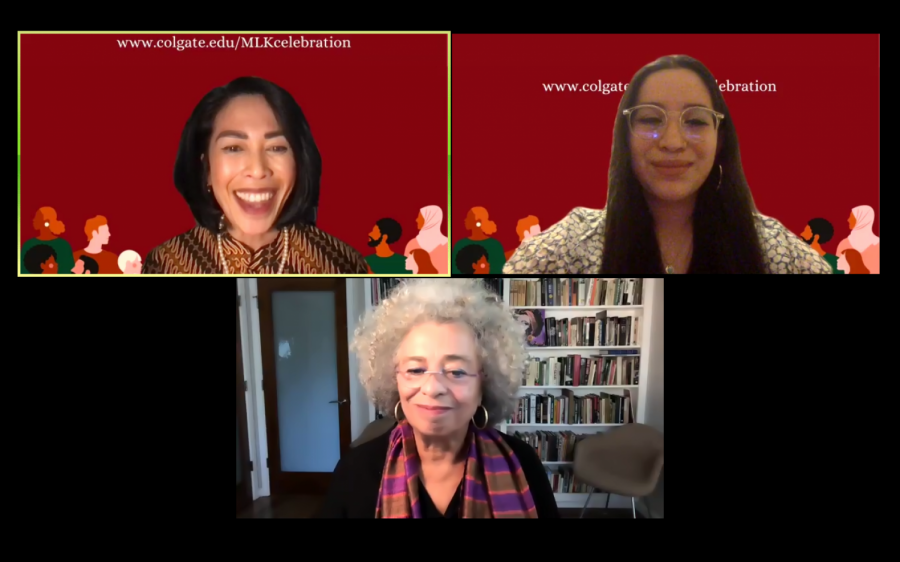Students React to MLK Celebration Keynote Speaker Angela Davis
Civil rights activist Angela Davis gave a keynote address to the Colgate University community last Thursday, Feb. 4. Organized and funded by the University’s Africana, Latin, Asian and Native American (ALANA) Cultural Center, the keynote speech took place via Zoom webinar and addressed issues of racism and reform of current systems such as the prison-industrial complex.
Davis emphasized her collective vision for the future of the world, envisioning “an end to the legacies of colonialism and slavery.” According to Davis, her vision cannot be achieved without the critique and reform of current oppressive systems in place and an embracing of what she called “aesthetic education,” which she explained as “an activism that relies on the imagination and the need to educate the imagination.”
Davis’ keynote address focused largely on her areas of expertise within activism; namely, the ultimate reform of the prison-industrial complex and policing system.
“We need to now look specifically and deeply at institutions: education, healthcare, and of course all of the institutions of policing and prisons. We need to develop new strategies for addressing the problems that these institutions have caused,” Davis said in her address. “Activism can happen anywhere. Oftentimes people assume they have to leave the space they inhabit to be an activist, but my sense is that we transform the terrains of our life — wherever we are — into the terrains of activism.”
Junior Nicole Weiss described herself as feeling “starstruck” when Davis spoke to the University community.
“I read her work in my women’s studies classes almost every week. To be able to speak to someone who has impacted my feminist journey so prominently was so inspiring,” Weiss said. “She said that activists should have the mentality that the change we promote will not be seen for generations to come, but it is still worth it to fight for the future.”
Director of the ALANA Cultural Center and keynote moderator Esther Rosbrook said she felt equally impacted by the keynote address.
“There are a lot of critical aspects that Angela Davis shared with the audience. As a moderator of the keynote event, I had the privilege of hearing Angela Davis’s firsthand perspectives,” Rosbrook said. “It was enlightening to hear Davis’ whys and resources of personal courage. I completely agree with her that everyone is responsible for addressing and combating racism.”
In particular, Rosbrook said Davis’ explanation of “aesthetic education” resonated with her.
“I think it is appropriate for her to encourage us to reflect on our current way of learning and teaching. She encouraged us to continue to imagine the new, better, and creative way of learning and producing,” Rosbrook said.
Rosbrook was also impressed by many of the students who asked Davis questions throughout the keynote address.
“[Senior] Edward Chao wowed Angela Davis with his ethics education in the K-12 system question. From the moderator seat, it was an inspiring moment to hear someone like Davis praise our students and their questions,” Rosbrook said. “I was personally proud of Edward Chao. I had to ask some clarifying questions to Davis, including the racial capitalism and brother-sister-comradery term, because I loved to learn from her.”
Lead Social Justice Peer Educator at ALANA and senior Jaritza Núñez reflected on the highlights and her takeaways from the address.
“During the stated session I asked Professor Davis about how we can continue to support younger audiences that are beginning their work in social justice movements,” Núñez said. “She mentioned that there is a need for progressive and radical educators and stressed the importance of being aware of ‘historical conjunctions,’ or ‘current moments.’”
Similar to Weiss and Rosbrook, Núñez described herself as feeling inspired by hearing Davis speak last Thursday.
“She’s always been someone that I have admired so it was really great just to be in her presence and hear her speak so passionately about social justice and change,” Núñez said. “I think her message is something that everyone should hear — if you missed the events, please read some of her work!”











